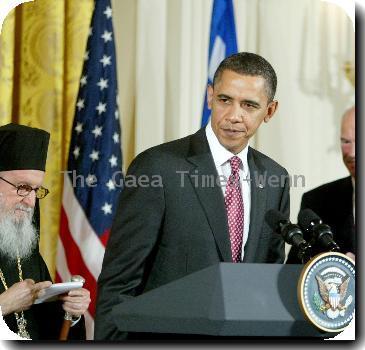Sarkozy emerges buoyed from euro rescue effort with high-spending French accent
By Angela Charlton, APWednesday, May 12, 2010
Sarkozy emerges buoyed from euro rescue effort
PARIS — The enormous rescue effort for the euro has a distinctly French flavor — even down to the cookies served in marathon negotiations — and is a big point scored for French President Nicolas Sarkozy.
France is loudly claiming credit, with Sarkozy’s prime minister saying French doggedness clinched the deal to try to save the currency that ties this continent together, and vowing to “reinvent the European model.”
In reality, the United States may have played a more pivotal role in the nearly $1 trillion deal. And markets aren’t certain that the dirigiste ideals that underpin the plan are sustainable in the long term across the 16 disparate economies that use euros.
For now, though, Sarkozy is proclaiming himself Greece’s savior and hoping that restores some of his sheen at home.
Europe’s other powerhouses, while crucial to securing the joint European Union-International Monetary Fund plan, come off looking sidelined: Germany’s Angela Merkel was humbled by agreeing to a rescue she long resisted; Britain was rudderless for days after inconclusive elections and in any case has a smaller role because it is outside the eurozone.
The resulting plan includes generous government backing for the loan package — something championed by France, where strong government involvement in the economy dates back to pre-revolutionary times — and a chastened European Central Bank.
In a bit of culinary symbolism, the snacks sustaining European leaders as they worked on the emergency deal were French, almond meringue macaroons at the negotiating table in Brussels.
From the start of the Greek debt crisis, Sarkozy was there, pushing since early this year for a robust rescue offer. Sarkozy initially failed to persuade Germany and other eurozone members to commit big funds to help Greece. Germany had hoped strict enforcement of existing EU finance rules would be enough to get through crisis.
In the French narrative, at least, when European leaders and their finance ministers met last weekend to try to stem global market panic about the euro, it was France that took control.
“We won a massive response from the European Union,” French Prime Minister Francois Fillon told parliament Tuesday. He said an emergency summit Friday night was held “largely at France’s request.”
The European Central Bank’s abrupt decision Monday to intervene to buy government bonds is something Sarkozy, among others, long had sought.
French officials said it was Sarkozy who persuaded Merkel to commit to a loan figure. President Barack Obama called both of them Sunday to urge a solution powerful enough to stabilize markets after volatility last week on Wall Street stemming from the euro crisis.
Sarkozy’s finance minister, Christine Lagarde, did much of the heavy lifting, using her good international contacts and negotiating savvy. She refrained from gloating, however, and said it was a joint effort involving all G-7 members.
Lagarde noted that France has plenty of its own work to do to tighten its budget in line with European Union rules. France has racked up heavy debt and has defied EU deficit limits.
The Greek crisis is a “wake-up call for all of us as far as? public finances are concerned and I’m sure it will be followed by appropriate review,” Lagarde told reporters Tuesday.
While the deal was being worked out in Brussels, Sarkozy avoided any public triumphalism and did his best to project a workmanlike image.
Back home, though, Sarkozy told aides that “in Greece, they call me a savior, unlike what they call me here,” according to French media reports. Sarkozy’s approval ratings at home have been in the doldrums for months.
While Sarkozy’s claims may be exaggerated, many Greeks do view him as having helped the country through the crisis.
A recent poll suggested Sarkozy is the most popular foreign leader among Greeks, and Merkel the least popular. The survey found 76.6 percent of respondents had a “positive” or “somewhat positive” view of Sarkozy, compared with 18.4 percent for Merkel. The poll by Kappa Research questioned 1,256 people by telephone April 28-29, and had a 2.59 percent margin of error.
Simon Tilford, chief economist at the European Center for Reform, noted that the plan for the euro included “some elements of the French model” such as a greater need for intervention and regulation. But he minimized France’s influence in bringing about the historic package.
The French “were very quick to recognize how serious the situation was and that does contrast with one or two other governments, notably Germany,” he said.
But he added, “I find the rhetoric coming out of France, with its attack on the markets as the reason behind the downfall of the eurozone, quite problematic.”
“The French authorities would make better use of their time in trying to address the lack of policy coordination within the eurozone” and trade imbalances, he said.
Associated Press writers Derek Gatopoulos in Athens and Deborah Seward, Emma Vandore and Christina Okello in Paris contributed to this report.

